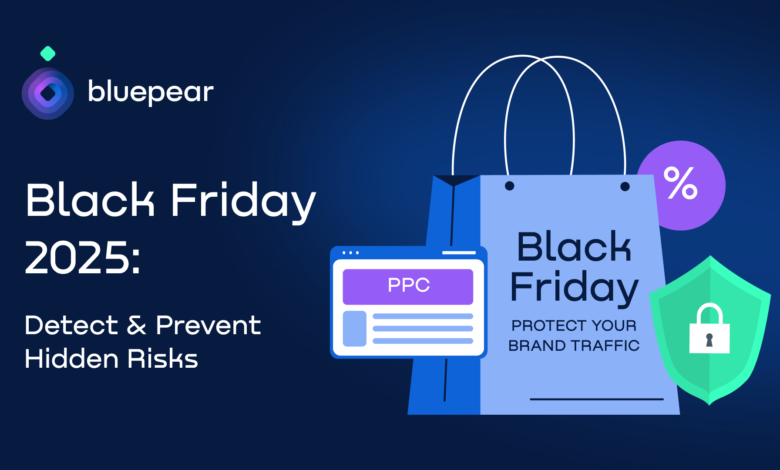2025 Black Friday: Your Ultimate Affiliate PPC Compliance Guide

▼ Summary
– Global Black Friday spending reached $74.4 billion in 2024, with U.S. online sales growing 10.2% year-over-year, intensifying affiliate and coupon competition.
– Coupon fraud and unauthorized brand bidding during peak sales events waste budgets, distort performance data, and steal conversions from brands.
– A 2024 study found 73% of retailers faced promo code misuse, with online fraud losses in the U.S. hitting $44 billion, largely due to coupon scams.
– Brands can protect themselves by auditing coupon sites, setting redemption limits, and using real-time monitoring tools to detect and block fraudulent activity.
– Automating PPC compliance with tools like Bluepear helps catch affiliate violations, collect evidence, and maintain clean paid channels during high-traffic periods.
Black Friday represents the pinnacle of performance for affiliate marketers, yet it also introduces significant financial risks. In 2024, global consumer spending hit an impressive $74.4 billion, with online sales in the United States climbing 10.2% compared to the previous year. This surge in spending brought with it intense affiliate competition and a flood of coupon activity, stretching paid advertising channels to their operational limits.
During these high-volume shopping days, a single non-compliant campaign can easily drain hundreds of thousands of dollars from your budget. Issues like coupon fraud, deceptive coupon scams, and unauthorized brand bidding interfere with your paid traffic, corrupt performance analytics, and divert conversions that rightfully belong to your brand.
This is precisely why robust PPC compliance and continuous promo code monitoring are not merely recommendations, they are essential practices for maintaining stable customer acquisition costs and preserving brand visibility when every click carries a premium.
Here we explore how coupon fraud and brand bidding can sabotage your paid traffic, and how real-time compliance solutions help safeguard your brand during periods of intense competition.
The Hidden Dangers of Black Friday Discounts
As online transaction volumes explode, so does the prevalence of coupon fraud and promotional code misuse. A recent 2024 study by Voucherify revealed that 73% of retailers experienced some type of promo code abuse in the past year, and many remained unaware until the financial impact surfaced in their performance reports.
Coupon scams can take various forms: repeatedly using a single-use promo code, exploiting codes intended exclusively for new customers, or circulating counterfeit promo codes from untrustworthy sources. Each instance of misuse directly reduces your profit margins and obscures the true drivers of your sales, creating particular challenges during high-traffic events like Black Friday when discounts generate massive visitor numbers.
The global repercussions of coupon scams continue to escalate. Statista data indicates that online fraud losses in the U.S. reached $44 billion in 2024, with a substantial portion connected to coupon fraud and promotional code abuse. Meanwhile, The Guardian highlighted how Black Friday has earned the nickname “Black Fraud Day” in some circles, reporting over 16,000 online fraud cases in the U.K. between November 2023 and January 2024. These incidents, frequently tied to coupon scams, resulted in average losses of £695 per victim.
The critical question remains: how can brands maintain control and protect themselves from coupon abuse when thousands of affiliates are operating at maximum capacity?
Monitor Promo Code Distribution Channels
Conduct regular audits of coupon websites and affiliate channels to verify that promo codes aren’t being reused, improperly shared, or published without authorization. This fundamental step helps prevent fake or stolen codes from gaining widespread circulation before they can cause significant damage.
Implement Strategic Redemption Limits
Establish restrictions on how many times a single promo code can be redeemed from the same user account, device, or IP address. This approach effectively prevents repeated redemptions and ensures that discounts reach genuine customers rather than fraudsters.
Leverage Technology for Real-Time Fraud Detection
Machine learning algorithms and behavioral analytics can identify suspicious promo code activity patterns and automatically block coupon fraud attempts before they affect your advertising budget. During competitive periods like Black Friday, continuous promo code monitoring becomes indispensable for preventing fraud, protecting profit margins, and maintaining brand integrity.
The Threat of Brand Bidding During Peak Seasons
As the 2025 Black Friday shopping frenzy approaches, competition for ready-to-purchase customers will reach unprecedented levels. Affiliates and competitors sometimes launch campaigns that violate PPC compliance guidelines, bidding on brand keywords, incorporating brand names into search queries, or even copying official advertisements through ad hijacking. Consequently, a customer searching for “Your Brand + Black Friday deal” might land on an affiliate page instead of your official site, forcing you to pay twice for the same customer, once for the ad click and again through affiliate commissions.
This practice, known as brand bidding, impacts your budget from multiple directions. When numerous affiliates compete for the same branded search terms, cost-per-click rates can increase by 15-25% during Black Friday peaks. More troubling, brands often inadvertently reward the very affiliates who intercept their paid traffic, paying both for the advertisement click and a commission on the resulting conversion.
Beyond wasted advertising spend, brand bidding also distorts your analytics. When affiliates begin capturing your organic and direct traffic, your performance metrics become unreliable, conversion rates decline, click-through rates appear weaker, and ROI calculations lose accuracy. On paper, campaigns seem to underperform, while in reality, portions of your budget are being redirected to imitation domains. The additional coupon traffic during Black Friday makes distinguishing legitimate activity from fraudulent behavior particularly challenging, as higher CPCs and seemingly improved conversions can mask underlying affiliate fraud.
Brand bidding issues often reveal themselves through accumulating inconsistencies. If your branded campaigns suddenly show increased clicks but decreased conversions, if unfamiliar domains begin displaying your logo or claiming “official” discounts, or if certain affiliates experience unexplained commission spikes, these all serve as warning signs that demand investigation.
Without consistent PPC compliance and promo code monitoring, these problematic patterns blend into the general Black Friday activity until they develop into substantial financial losses.
Essential Black Friday Compliance Strategy
Black Friday is the ultimate stress test for affiliate programs. With hundreds of partners, promo codes, and PPC campaigns running simultaneously, even established systems can buckle under pressure. This framework outlines how to prevent coupon fraud, control brand bidding, and keep paid channels clean when competition peaks.
Set Clear Affiliate Program Rules
Begin with unambiguous program policies. Prohibit brand bidding, unauthorized coupon sharing, and PPC keyword violations. Spell out consequences, commission voiding, temporary suspensions, or permanent removal for repeat offenders. Clarity at the start prevents disputes later and ensures every partner understands the rules of engagement.
Monitor Brand Activity Proactively
Run regular searches for terms like “Your Brand + Black Friday,” “Your Brand + deal,” and “Your Brand + coupon.” Test across multiple regions, devices, and times, including nights and weekends, when hidden campaigns tend to surface. Document everything: ad copies, domains, redirect paths, and affiliate IDs. Thorough evidence collection is your strongest defense in compliance disputes.
Detect Performance Irregularities Early
Keep an eye out for sudden surges in affiliate activity. Watch for:
- Conversion rates that spike to 100%
- Drops in brand impression share
- Unusual peaks in coupon redemptions
Continuous promo code monitoring helps identify fraud before it affects performance metrics or budgets.
Control Coupon Distribution
Assign unique coupon codes to each traffic source. Set clear expiration dates and audit coupon sites and browser extensions regularly. The moment a code leaks, deactivate it and issue a replacement. Rapid intervention limits damage and preserves your discount strategy’s integrity.
Maintain Complete Evidence Logs
Store screenshots, landing page copies, redirect chains, and affiliate identifiers. When disputes arise, complete documentation accelerates resolution with networks or legal teams and supports any compliance actions you take.
Act Fast on Confirmed Violations
Once a violation is verified, report it, suspend the affiliate, and revoke commissions for the affected period. Manual oversight during Black Friday is unrealistic, so automation becomes essential.
Platforms like Bluepear simplify the process: scanning search results, detecting anomalies, recording evidence, and issuing real-time alerts. These systems keep PPC channels protected when activity peaks and human review can’t keep up.
Build a Continuous Monitoring Framework
A baseline monitoring setup can catch most hidden campaigns without straining your team.
- Geographic Scope: Focus on three to five key countries and a few major cities where affiliate activity is highest.
- Device Coverage: Include desktop, mobile, and tablet checks, fraud often hides in mobile-only placements.
- Timing: Schedule scans overnight and on weekends to uncover stealth campaigns.
- Data Collection: Archive all search results and redirect logs for future reference.
- Scan Frequency: Every one to three hours strikes a balance between visibility and cost efficiency.
Automate Detection with Real User Simulations
Affiliate violations can appear and vanish in minutes. Automation is the only practical way to track them.
Tools like Bluepear mimic real users, browsing from residential IPs, switching devices, and testing across languages and regions. They capture what actual customers see, including cloaked ads and coupon scams that traditional monitors miss.
Setup takes minutes: register your brand project, list key domains and landing pages, and enter branded keywords like “Your Brand + Black Friday” or “Your Brand + coupon.” The system scans continuously across devices and time zones, recording screenshots and redirect paths to create a complete evidence trail.
Dashboards display each case status, New, In Progress, Resolved, and distinguish between competitor and affiliate findings. Compliance teams can act before ad spend is wasted or attribution becomes distorted.
Protect Budgets Before the Rush
Black Friday rewards precision and punishes delay. When coupon fraud or brand bidding go unchecked, performance data becomes unreliable and spend drains rapidly.
Leading brands don’t wait for issues to surface, they automate protection, verify promo codes in real time, and act on verified evidence. Embedding PPC compliance into daily operations ensures accurate attribution, fair commissions, and fewer surprises when traffic surges.
With automation managing the constant monitoring, your team stays focused on strategy and growth, not crisis control.
Bluepear currently offers a 7-day free trial, making this the ideal time to implement a compliance and coupon monitoring system before the Black Friday rush.
(Source: Search Engine Land)


